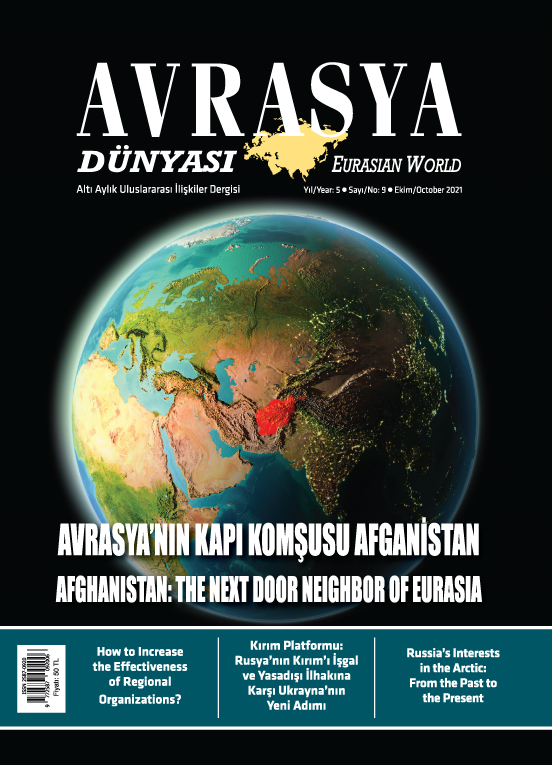Most sincere greetings to all our readers. We like to express our delight to present the 9th issue of the Eurasian World.
We take pride in completing the fourth year of our journal. It feels like yesterday when we began the preparation of the publication of the first issue of the Eurasian World. We like to take this occasion to express our gratitude for your close interest.
Our readers are by now accustomed to our editorial policy of focusing on a specific topic in each issue, in addition to the current developments in the Eurasian region. The specific topic of this issue is the latest developments in Afghanistan.
Our readers already know that we closely monitor countries like Iran, Afghanistan, India, China and some others for their geographical location, importance and close relations with the Eurasian region. The latest developments in Afghanistan, which are beyond just a regime change, with their possible repercussions on Eurasia and further on the global political/military balances has been the reason of this choice.
As a matter of fact, as we have been stressing for some time, a great transformation has been taking place in the political and economic balances in the world. World’s center of gravity is moving from Euro-Atlantic to Asia-Pacific. It has been evident for some time that the United States of America, which has been the prevalent power in Afghanistan, has begun to embrace a new policy in line with this change. By withdrawing from Afghanistan, the US has taken a step to shrink back from the Middle East following Europe, and to concentrate more on Asia-Pacific. In such a context, China that has become the second largest economy in the world, displays its intentions to dominate the Asia-Pacific by show of force. China also manifest its desire to open up to Eurasia and further beyond by its Belt and Road Initiative that covers 140 countries. Afghanistan rests in the center of all these developments. In the section titled “Afghanistan: The Next Door Neighbor of Eurasia,” we present four articles penned by specialists.
We, once again, like to thank our readers for their interest in the Eurasian World and again state that we highly value your views and look forward to your inputs. Enjoy the reading.
“Central Asia from Difficulties on the Way of Rapprochement to a New Way of Integration,” Nosirkhon Qodirov
“Uzbekistan in a New Role? Mirziyoyev’s Policy of Opening to the Neighbourhood,” Pál Gyene
“The Regional Significance of Tajikistan and its Role in Turkey’s Central Asian Policy,” Dávid Biró
“China’s Posture towards Central Asia Before and After the Taliban’s Advances in Afghanistan,” Safiye Ergun
“How to Increase the Effectiveness of Regional Organizations?” Michael B. Christides
“Afghanistan Uunder Taliban Rule, the Uncertain Future Ahead,” Hossein Ebrahim Khani
“Afghanistan: The Results of American Intervention and Prospects of Taliban Rule,” Mykola Zamikula
“China and Afghanistan in the New Era,” Emil Avdaliani
“‘Neo-Taliban’ Rule in Afghanistan: Implications for Turkey in the Context of Eurasia,” Mehmet Oğuzhan Tulun
“Kırım Platformu: Rusya’nın Kırım’I İşgal ve Yasadışı İlhakına Karşı Ukrayna’nın Yeni Adımı,” Fethi Kurtiy Şahin
“Russia’s Interests in the Arctic: From the Past to the Present,” Ksenia Gökmen
“Sovyet Sonrası Dönemde Özbekistan’da Din Temelli Muhalefet ve 2005 Yılı Andican Olayları,” Melih Demirtaş
“Göçebeliğin Uzak Bir Yansıması Olan Sembolik Göçebelik Kavramının Kazakistan’da Gelişim Süreci,” Alparslan Özkan
Nosirkhon Qodirov (Intern, Eurasian Studies Graduate Program, Middle East Technical University, Ankara, Turkey; Ph.D. Student, Doctoral School of Law and Political Science, University of Szeged, Szeged, Hungary)
Pál Gyene (Assist. Prof., Department of International Relations, Budapest Business School, Budapest, Hungary)
Dávid Biró (Ph.D. Student, Department of Modern and Contemporary History, Eötvös Loránd University, Budapest, Hungary)
Safiye Ergun (Master’s Student, Eurasian Studies Graduate Program, Middle East Technical University, Ankara, Turkey)
Michael B. Christides (Ambassador (a.h.), Secretary General of the Permanent International Secretariat of the Organization of the Black Sea Economic Cooperation (BSEC PERMIS))
Hossein Ebrahim Khani (Former Ambassador; Senior Research Fellow, Institute for Political and International Studies (IPIS), Tehran, Iran)
Mykola Zamikula (Senior Research Fellow, National Institute for Strategic Studies, Kyiv, Ukraine)
Emil Avdaliani (Prof., European University, Tbilisi, Georgia)
Mehmet Oğuzhan Tulun (Analyst, Center for Eurasian Studies (AVİM))
Fethi Kurtiy Şahin (Research Assistant, Area Studies Doctorate Program, Middle East Technical University, Ankara, Turkey)
Ksenia Gökmen (Eurasian Studies Graduate Program, Middle East Technical University, Ankara, Turkey)
Melih Demirtaş (Ph.D. Candidate, Area Studies Doctorate Program, Middle East Technical University, Ankara, Turkey)
Alparslan Özkan (Ph.D Student, Institute of Turkish Studies, Hacettepe University, Ankara, Turkey)


